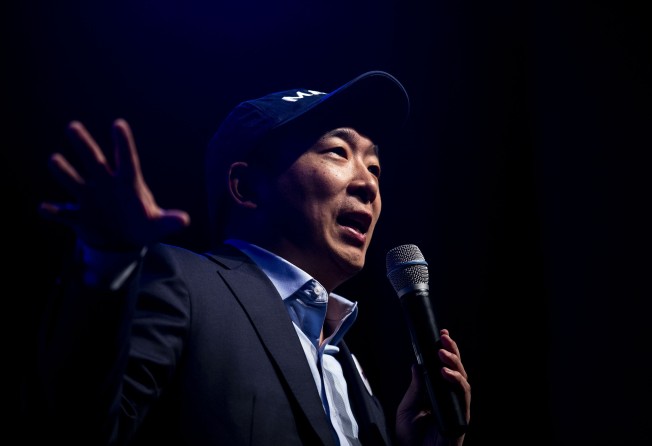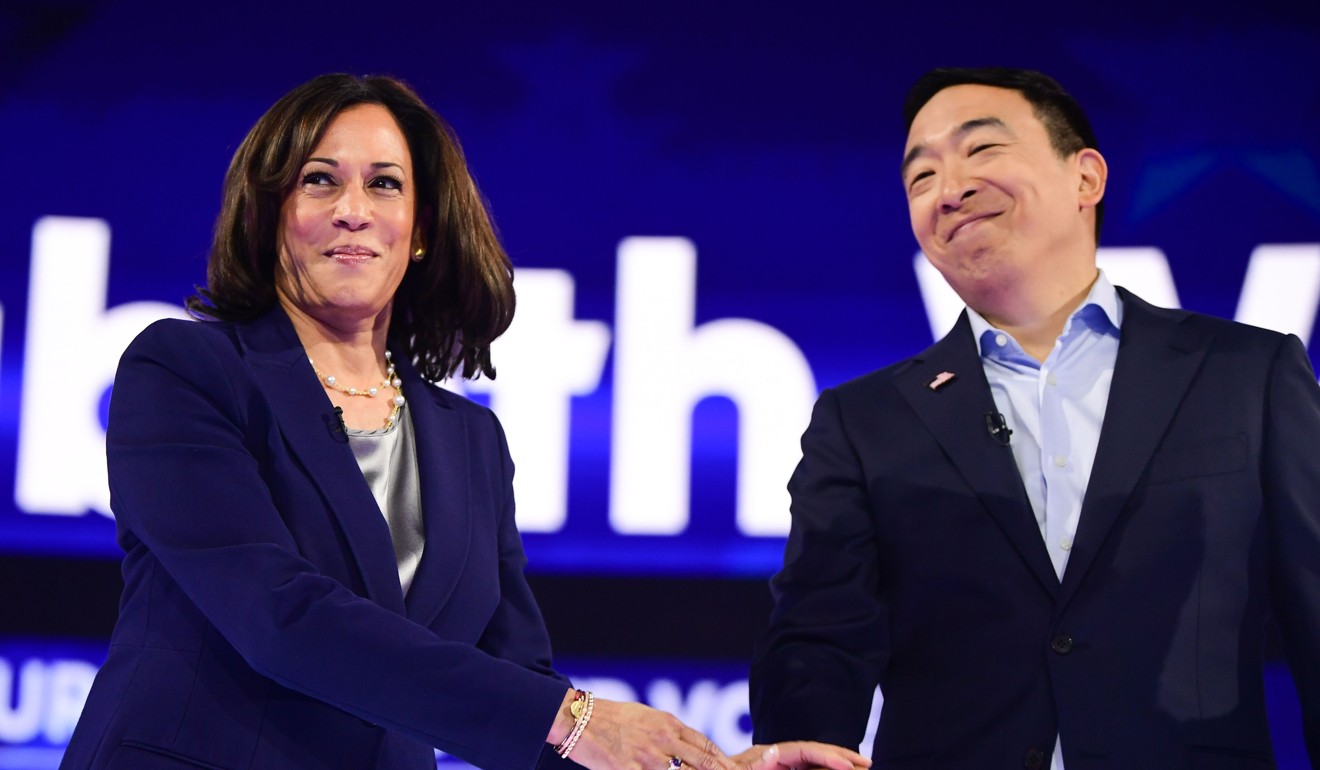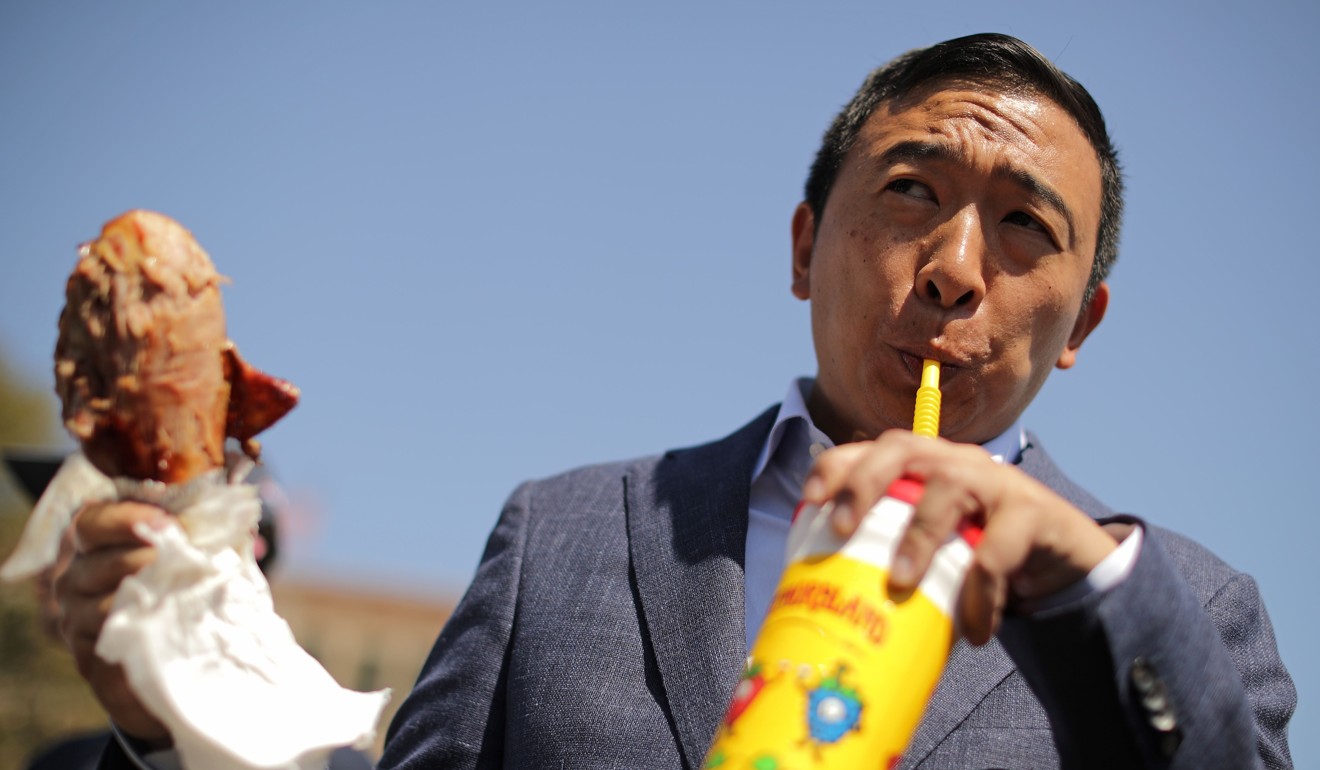"I'm asian, I know a lot of doctors," -- @AndrewYang on his healthcare plan pic.twitter.com/wV5rliDcO9
— Washington Examiner (@dcexaminer) September 13, 2019
Asian-Americans bristle at stereotypes as Andrew Yang says he ‘knows a lot of doctors’
- Some feel presidential candidate is reinforcing model-minority myth with remarks during third Democratic debate
- Yang, son of Taiwanese immigrants, has also made comments on campaign trail playing to stereotype of studious, maths-loving Asian-Americans

Jenn Fang was home on Thursday night, not really paying attention to the third Democratic debate, when she came across a video clip circulating on Twitter showing presidential candidate Andrew Yang casually declaring onstage, “I’m Asian, so I know a lot of doctors.”
For Yang, it was a lead-in to a broader response on health care. But for Fang, it was grating.
“I found this part galling because here he is sort of obtusely reinforcing the model-minority myth and model-minority stereotypes,” said Fang, who runs the blog Reappropriate, where she writes about Asian-American and feminist issues.
Yang, perhaps the highest-profile East Asian presidential candidate in history, regularly makes comments on the campaign trail that play to the stereotype of Asian-Americans as studious, maths-loving and hard-working.
To some, it is a refreshing dose of self-deprecating humour; to many others, such comments are cringeworthy or amplify a stereotype – of Asian-Americans as a “model minority” – they say is harmful.
Fang said white primary-care doctors, for example, outnumber Asian ones by nearly seven to one.
“Yet we don’t see white people saying, ‘I’m white, therefore I know a lot of doctors,’” Fang tweeted. “Because white normative identity politics accepts diversity in whites, but rejects it in nonwhites.”
Yang’s Asian identity is not central to his candidacy, but he has not shied away from the subject. This week, he weighed in on the hiring by Saturday Night Live of Shane Gillis, who was found to have used racial slurs against Asians on his podcast.
“I prefer comedy that makes people think and doesn’t take cheap shots,” Yang tweeted, offering to “sit down” with Gillis, who was dropped from the show’s cast on Monday.
On Sunday, CNN’s Jake Tapper asked Yang about the SNL controversy – then about the broader criticism directed at his own jokes and whether they perpetuate Asian stereotypes. Yang suggested he did not see his comments in that way.
“The Asian-American community is very diverse, and certainly I would never claim that my individual experience would speak to the depth and the breadth of our community,” Yang said.
“At the same time, I think Americans are very smart and that they can actually see right through that kind of myth. And if anything, by poking fun at it, I’m making Americans reflect more on it.”
The Yang comments that have prompted the most criticism are his references to being “good at math” or working hard because he is Asian. Yang’s “doctors” remark at the third debate struck a particularly polarising chord, dividing those who defended it as a funny quip and those who found it problematic.
Yang literally said that he knows doctors because he’s Asian. This totally unsophisticated and stereotypical statement ignores the fact that many Asians are not ethnically or economically privileged enough to “know a lot of doctors.”
— Reappropriate (@reappropriate) September 13, 2019
It elicited an “LOL” from former Planned Parenthood president Leana Wen. Former Louisiana governor and one-time Republican presidential candidate Bobby Jindal called it his “favourite line” of the debate.
Others, though, labelled it everything from “uncomfortable” to “disappointing,” with some saying they were tired of Yang leaning into stereotypes about Asian-Americans since the beginning of his campaign.
“I am an Asian-American, I don’t know more doctors than anyone else,” Mia Ives-Rublee, founder of the Women’s March Disability Caucus, wrote on Twitter. “I am really sick of Andrew Yang and how he continuously hurts the [Asian-American and Pacific Islander] community by using stereotypes that have harmed our community for centuries. It’s not cute. It’s not OK.”
Yang was a relatively unknown businessman when he launched his long-shot presidential run in late 2017. He has since outperformed expectations, meeting fundraising and polling thresholds to qualify for four presidential debates and outlasting several governors and lawmakers who have dropped out of the race.
Most of the focus on Yang – by his campaign and by the media – has been on his signature platform of “universal basic income”, the promise of a US$1,000 monthly dividend given to US citizens, which he says is one of the few ways to counter the erosion of jobs lost to automation.
Less attention has been paid to the potentially historic nature of Yang’s candidacy, even as other Democrats in a field with unprecedented diversity regularly tackle questions about race and identity.
Even so, Yang periodically sprinkles remarks about being Asian-American into his public comments. “If you’ve heard anything about me, you’ve heard there’s an Asian guy running for president who wants to give everyone US$1,000 a month,” he often says.
In his 2018 book, The War on Normal People, Yang briefly discusses growing up as the son of immigrants from Taiwan, “a skinny Asian kid” in upstate New York who suffered racial slurs and was bullied.

“I’ve been called chink and gook any number of times in my life,” Yang tweeted last week. “It can be extraordinarily hurtful to feel like you are somehow not part of the only country you have ever known. I have certainly felt that – the churning sense of alienation, anger and marginalisation.”
Often his comments come with an air of humorous self-deprecation. He frequently casts himself as the polar opposite of US President Trump – “an Asian guy who’s good at math” – and sells merchandise with “MATH” emblazoned on it, an acronym for “Make America Think Harder”.
At times Yang has evoked racial stereotypes seemingly unnecessarily. In July, Yang appeared on Fox News, where host Chris Wallace asked whether he was concerned that people would lose work-derived self-esteem, among other things, under his proposal for universal basic income.
“Well, I’m Asian, so you know I love to work,” Yang told Wallace, before delving into how he would broaden the definition of work.
It is these offhand remarks that have left some Asian-Americans feeling disaffected, even as they acknowledge his candidacy is historic.
“While it’s certainly dangerous to deploy stereotypes, Andrew Yang is also breaking stereotypes by seeking the presidential nomination,” said Janelle Wong, a professor of Asian-American studies at the University of Maryland. “It puts even more pressure on him to discuss the ways in which race has mattered for who he is today, including beyond being good at math.”
Many Asian-Americans chafe at the “model minority” stereotype. On its face, the image is supposedly a positive one – of immigrants who work unusually hard, enjoy maths and are professionally successful.
But it ignores outside factors that helped shape those perceptions and erases the realities of Asian-Americans with different experiences, scholars say, while also glossing over the ways in which the model-minority myth has been used to harm other minority groups, by suggesting they are somehow less impressive in comparison.
Make America think Harder. Beat the #MAGA Mess with Simple #MATH
Vote Smart! #Yang2020 https://t.co/LCedYWx3lC pic.twitter.com/CdzjwQN7Z9— Sisilili (@SisiLiliDidi) March 24, 2019
Wong said when Chinese people were recruited to the United States as railroad and agricultural workers in the mid-1800s, there was no talk of their work ethic or accomplishments. Chinese immigrants were often treated with suspicion and discrimination; in 1882, the Chinese Exclusion Act became the first federal law to prohibit immigration based on race.
As US immigration policy opened up in later decades, the focus was on family reunification, skilled labourers and those fleeing wars or unrest in their native countries.
“East Asians in particular were recruited based on skills, and then they were able to sponsor family members who were also highly educated,” Wong said. “That’s when we started to see things change more systematically.”
By the 1990s, there was an increase in international students from Asia and H-1B visas granted to Asian immigrants.
“It’s not a cultural trait of Asians – it’s really our immigration policies,” Wong said. “And that translated into this stereotype of the model minority, when in fact it’s our immigration laws and the [fact that the] biggest predictor of getting a college degree is parents’ education and income.”
One danger of the myth is that it is weaponised against other minorities to suggest they are not as hard-working, law-abiding or successful, said Ellen Wu, director of the Asian-American studies programme at Indiana University and author of The Color of Success.
“The biggest risk in my mind is … the work that this stereotype does to dehumanise, to criminalise African-Americans,” Wu said. “I’m not saying Andrew Yang himself is doing this but that the larger cultural work, political work of this stereotype that’s been around since the 1950s and 60s has functioned in upholding assumptions about African-Americans.”

It also glides over the widely varied experiences of Asian-American immigrants. According to a 2018 Pew Research Centre study, Asian-Americans have the largest income disparity of any ethnic group, and that income gap is widening rapidly.
In 2015, for instance, 72 per cent of adult Indian immigrants had at least a bachelor’s degree, compared with 9 per cent among Bhutanese immigrants, who largely arrived in the United States as political refugees.
The study also found median household incomes topped six figures for some Asian-American groups, while about a third of Burmese and Bhutanese immigrants live in poverty.
Yang “implicitly suggests that the Asian-American experience is only represented by his specific middle-to-wealthy-upper-class East Asian American experience,” Fang said. That, she said, “completely flattens all of the other ways people are Asian-American and don’t have access to health care and access to higher education”.